Thursday, March 31, 2022
Review: Offering red pill about North Korea, new book instead jettisons truth | NK News
After Ukraine, it’s time to take North Korea’s reunification aims seriously | NK News
After Ukraine, it’s time to take North Korea’s reunification aims seriously
Few expected Russia to invade. Now the world must prepare for the day DPRK too presses its land claims over South Korea
Benjamin R. Young March 17, 2022
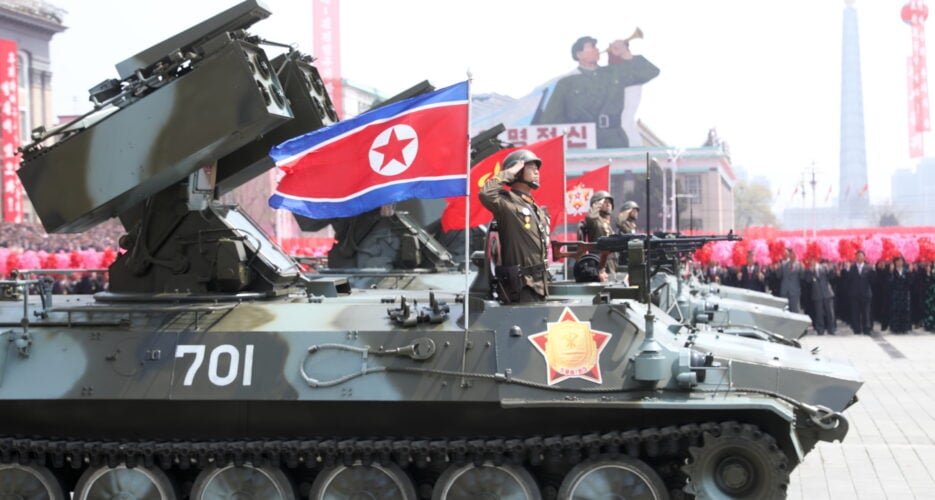
SHARE
Soldiers salute from armored tanks as they roll through Kim Il Sung Square during a military parade, April 2017 | Image: NK News (file)
As Russia continues its assault on Ukraine, it’s almost hard to remember that for months before the invasion, many thought it would never happen.
Experts and analysts cited the huge financial costs that would be unbearable for the Kremlin. Others believed Putin was merely saber-rattling in order to get the best deal out of NATO negotiations. One researcher wrote that a full-scale war was out of character for Russia’s grand strategy and “does not really fit into how the Kremlin has used hard power in its geopolitical games.”
In other words, Russia’s invasion took many by surprise. We shouldn’t be surprised, however, if and when North Korea restarts military conflict with South Korea.
Just as Russian leader Vladimir Putin sees Ukraine as an inalienable part of Russian civilization, the North Korean leadership views reunification of the Korean Peninsula as a sacred duty. The international community needs to prepare for the day Pyongyang tries to press its claims to all of Korea.
VIOLENT REUNIFICATION
This is not an outlandish scenario in 2022. What Putin is demonstrating is that autocrats live in a separate echo chamber, not necessarily an irrational one, but one with an altogether different set of values than most people.
Often, authoritarian leaders believe their own myths and that they have an indispensable role to play in world history. For example, given his worldview of Russian greatness and imperial visions of a rejuvenated Russian Empire, Putin is acting rationally. For him, Russians and Ukrainians are one people. If you take these views seriously, Putin’s war in Ukraine makes perfect sense. The regime in Kyiv was illegitimate and therefore a direct affront to Russian dignity.
We need to apply this same seriousness to North Korean official rhetoric and ideology. It is time to stop regarding North Korea’s militant discourse as irrational hogwash and Kim Jong Un as a buffoonish leader concerned only with his own luxurious life. Korea faces an impending security crisis that will involve nuclear powers, most notably the U.S. and China.
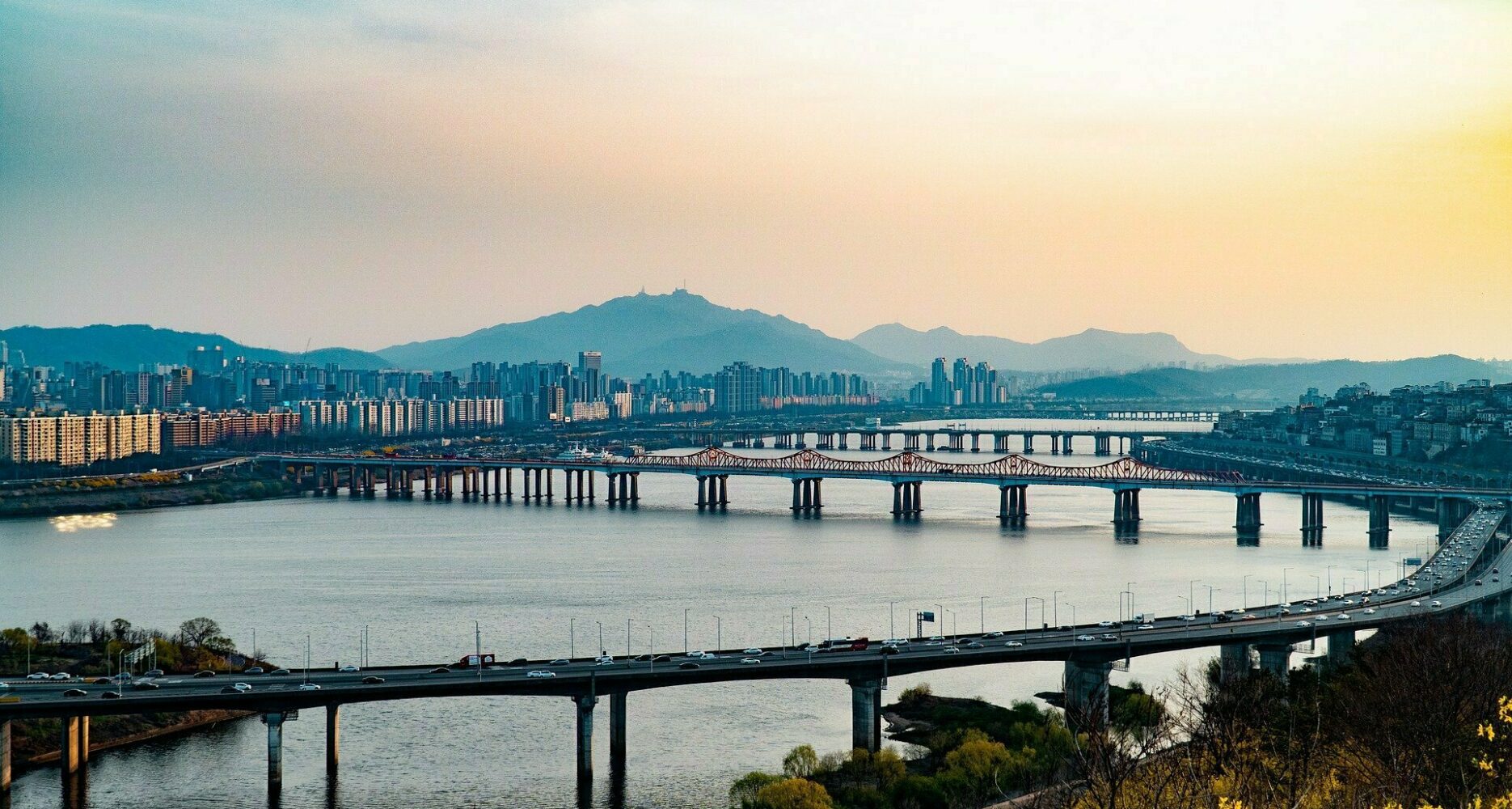 The Han River that bisects Seoul, the South Korean capital | Image: Pixabay
The Han River that bisects Seoul, the South Korean capital | Image: PixabayLike Moscow sees Kyiv, Pyongyang sees the government in Seoul as illegitimate — a U.S puppet regime. This view has not changed since the 1940s, and North Korea dreams of reunifying the two Koreas under Pyongyang’s terms. We should not dismiss these reunification aims as mere talk.
With long-range artillery, sophisticated cyber capabilities and a nuclear arsenal, North Korea’s military should not be taken lightly. Add in military assistance and logistical support from Beijing, and North Korea has a formidable conventional and irregular military force that could destabilize the entire Indo-Pacific region.
Compared to the “freer” atmosphere of Russia, the North Korean government indoctrinates and mobilizes its citizens on a massive scale. During the COVID-19 pandemic, political education has taken on greater importance in the DPRK.
Unlike Russian soldiers in Ukraine, North Korea’s massive army would be much more motivated in liberating their southern brethren. From an early age, North Koreans have been taught that the South Koreans are oppressed under Western imperialism. They will be highly motivated to fight if unleashed on the battlefield.
CHIPPING AWAY
Kim Jong Un’s reunification plan will be an integrated political and military strategy. Pyongyang’s notion of “final victory” is a longer term plan that is meant to slowly weaken South Korean political and cultural institutions.
First, a large body of evidence suggests North Koreans hope to remove the U.S. military presence from the Korean Peninsula. Former U.S. President Donald Trump nearly did that during his four-year term. Trump’s former ambassador to Germany said, “Donald Trump was very clear, we want to bring troops from Syria, Afghanistan, Iraq, from South Korea, Japan, from Germany.” If Trump, or a member of his family, is elected in 2024, there is a very real possibility that the U.S. removes its troops from South Korean soil.
Second, in their reunification plan, the North Koreans will slowly cut away at the strength of South Korean political institutions and advance the withering away of the ROK state. From disseminating misinformation to launching small-scale guerilla attacks, North Korea’s pro-reunification revolutionary strategy will involve a mix of irregular warfare and covert political operations.
This may even involve overtaking a small part of South Korean territory. Akin to Russia’s annexation of Crimea, Pyongyang could take an island or islands in disputed waters off Korea’s west coast. Let’s not forget that back in 2010 North Korean artillery bombarded Yeonpyeong island, killing four and nearly instigating the South Koreans into retaliating.
 A fishing boat off the coast of Yeonpyeong-do, the South Korean island near the inter-Korean maritime border that was hit by North Korean artillery fire in 2010, killing four | Image: NK News (file)
A fishing boat off the coast of Yeonpyeong-do, the South Korean island near the inter-Korean maritime border that was hit by North Korean artillery fire in 2010, killing four | Image: NK News (file)What will happen when Pyongyang takes a small piece of South Korean territory or infiltrates ROK high politics with pro-DPRK agents? As we have seen in South Korea, little is done to deter North Korean aggression and military adventurism. North Korea’s nuclear arsenal and artillery have long-held Seoul in check and reduced the ability of an assertive response to Pyongyang’s provocations.
The government in Seoul typically issues some strongly worded condemnations and then quickly goes back to settling domestic political squabbles. For too long, the South Korean government, especially those on the Left, has treated Pyongyang as the slightly crazy uncle in the family but one that is still considered an essential part of the ethnic nation (minjok).
Putin’s war in Ukraine has broken many conventions of international norms and standards. Many Westerners simply believed a conventional land war in 21st century Europe was out of the realm of possibility. Let’s not make these same mistakes in Korea.
North Korea has acted belligerently in the past and the same tyrannical family-led regime in Pyongyang even invaded the South in 1950. It is more likely than not it will try and do so again. Kim Jong Un is part of a system and political culture that adheres to a belief in the inevitability of Korean reunification. It is time to take that idea seriously.
Edited by Arius Derr
Book review: The intractable dilemma of North Korean human rights | NK News
Book review: The intractable dilemma of North Korean human rights
‘The North Korea Conundrum’ explores how to push for the DPRK’s denuclearization without abandoning human rights
David Tizzard March 24, 2022
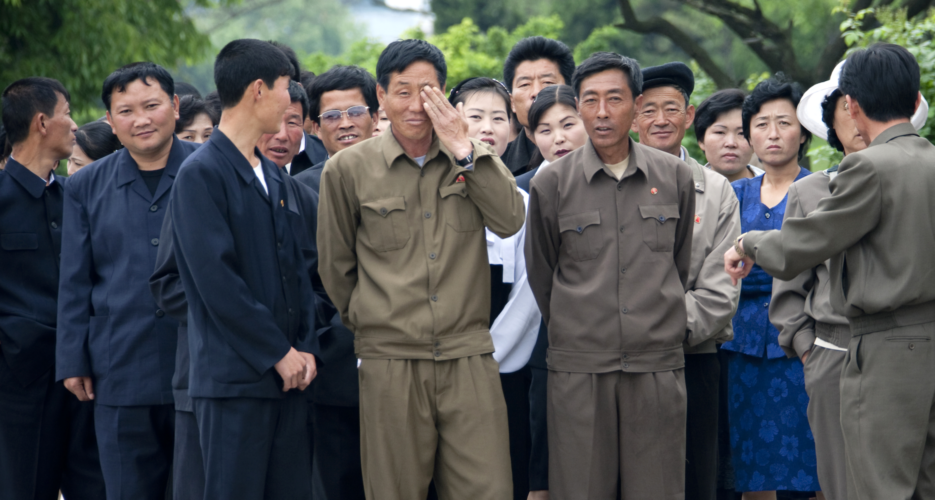
SHARE
North Koreans wait to visit a monument in Pyongyang on May 16, 2009 | Image: Eric Lafforgue
When it comes to North Korea, most media outlets focus on the missiles that Pyongyang frequently fires into the East Sea, or the cigarettes, hairstyle, weight and fashion of leader Kim Jong Un. It can be easy to lose sight of the lives of the DPRK’s 25 million people, the vast majority of whom are not allowed to leave the country or learn about the outside world.
“The North Korean Conundrum,” a new book featuring essays from around a dozen authors, seeks to address this imbalance by considering human beings rather than nuclear weapons. And it achieves this goal with professional, well-researched contributions.
In their introduction, former U.S. special envoy for North Korean human rights Robert King and scholar Gi-Wook Shin of Stanford University write that the book’s stated goal is “not to delegitimize or undermine the regime but rather to help North Korea to move toward becoming a positive and contributing participant in the international community.” The book also acknowledges modest progress that Pyongyang has made in becoming a signatory to various conventions, particularly those to protect children and people with disabilities.
However, the book makes clear that it is essential for the DPRK to show “improvement in human rights, including religious freedom.” And if North Korea is to continue benefiting from the legitimacy and authority gained from U.N. membership, it must live up to the responsibilities to which it has agreed. This means recognizing and protecting human rights inside its own borders.
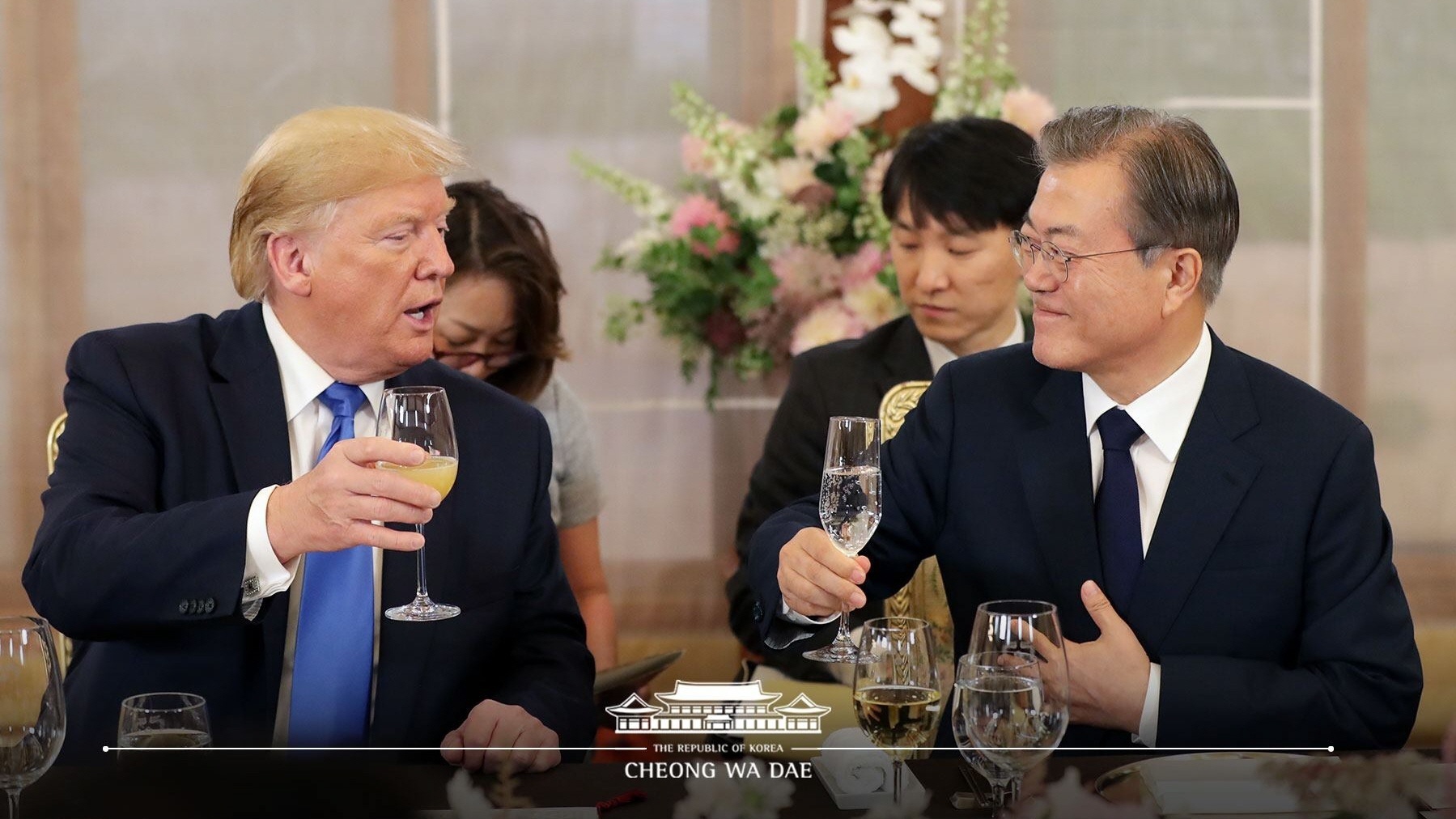 U.S. President Donald Trump and South Korean President Moon Jae-in at the Blue House in Seoul on June 29, 2019 | Image: Presidential Blue House
U.S. President Donald Trump and South Korean President Moon Jae-in at the Blue House in Seoul on June 29, 2019 | Image: Presidential Blue HouseIt’s no secret that North Korea has serious human rights problems: Its citizens do not have freedom of travel, freedom of religion, nor the freedom to form a genuine political opposition to the Workers’ Party of Korea. What this book does well is detail the DPRK’s developments (or lack thereof) on human rights through research and documentation.
Unlike some other efforts, this is not an emotional cry for freedom or a demand that the world simply give peace a chance. Nor is it an exploration of the genealogy of human rights as a concept or a defense of its utility to North Korea’s situation. Readers unconvinced of the value of human rights will not find arguments here seeking to persuade them otherwise.
Instead, it is a level-headed analysis of the situation and an objective study of North Korean citizens’ lack of rights. The contributors carry this out by studying the U.N., the international community and the importance of information and security in the modern world.
Dreams of unification are misguided, Michael Kirby writes in his chapter on the U.N.’s human rights commission, arguing that silence on human rights issues in pursuit of those dreams is unacceptable. The volume’s editors and other writers also criticize President Moon Jae-in for “paying scant attention to human rights” in his pursuit of inter-Korean engagement.
The Trump administration also receives rebukes for downplaying human rights in its own pursuit of condos north of the 38th parallel. In his chapter, Victor Cha challenges the prevailing notion that human rights and denuclearization are opposing issues in zero-sum policy decisions, while arguing that leaders have treated them as such by ignoring human rights when pushing for summits.
Joon Oh’s work suggests North Korea has responded relatively positively to peer-reviewed human rights studies inside its borders and has ratified treaties achieved through such means. Oh also questions whether the U.N.’s approach of merely “naming and shaming” those perceived guilty of violations is effective.
Meanwhile, Minjung Kim challenges stereotypes that conversations on North Korean human rights are the sole preserve of South Korean conservatives, a topic of particular relevance with ROK president-elect Yoon Suk-yeol set to take office in May. She explores the impact information can have in bringing about an internal revolution and the importance of nongovernmental organizations.
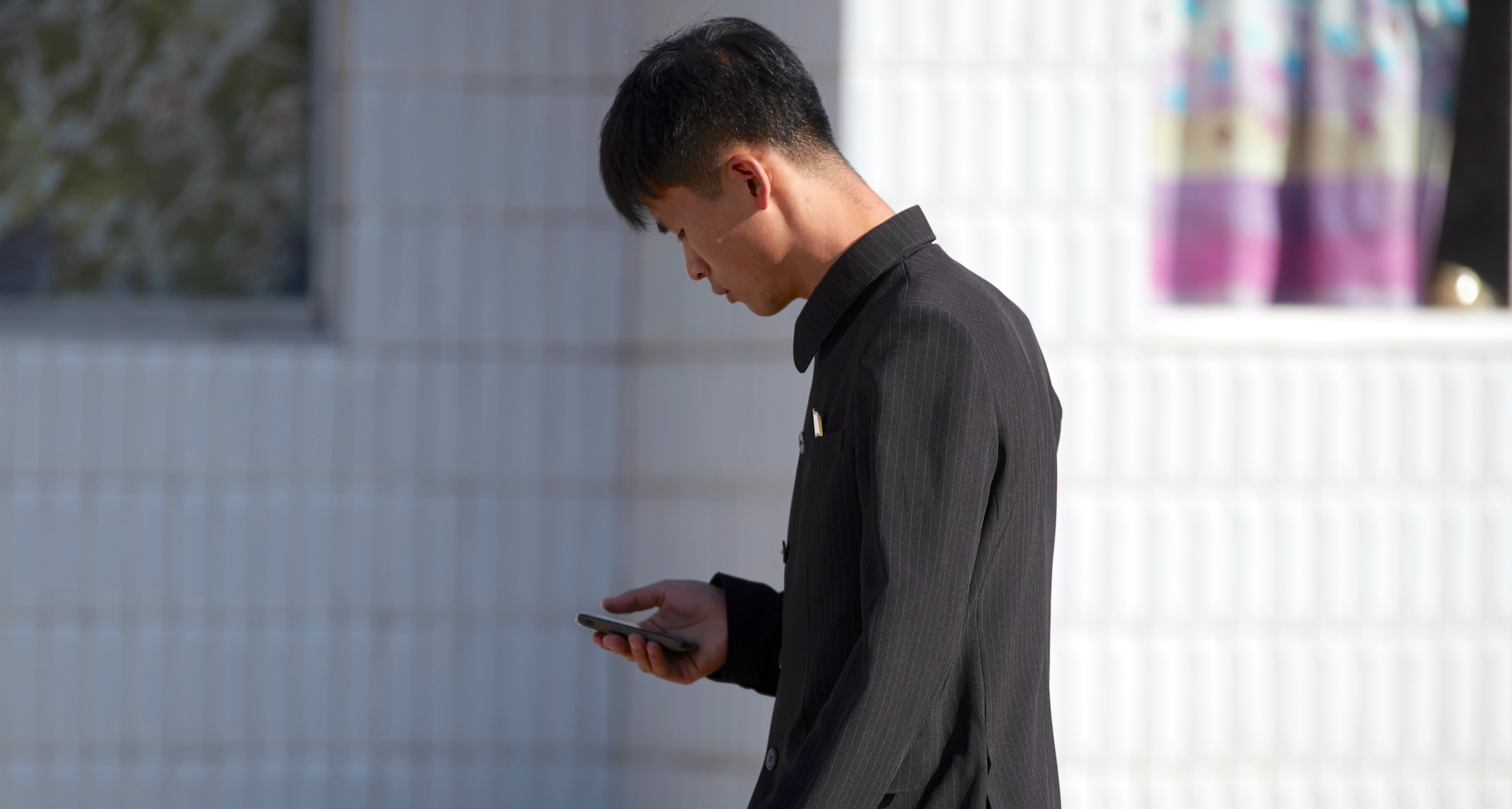 A man uses a smartphone in Pyongyang on Oct. 6, 2016 | Image: NK News
A man uses a smartphone in Pyongyang on Oct. 6, 2016 | Image: NK NewsNat Kretchun’s chapter continues the focus on information and defector testimony, while also advocating solutions found that can be achieved through internal rather than external change. Martyn Williams’ study of mechanisms of content control inside North Korea is detailed and informative. It also seeks to downplay rumors that the death penalty is employed against those who watch foreign media, though he still concludes that the “future remains bleak” for North Koreans given the totalitarian power of the state.
Gi-Wook Shin correctly notes that, “While it is easy to condemn Pyongyang on moral grounds, it is much more challenging to come up with a practical solution.” Indeed, in the protection of its citizens’ human rights, North Korea has not allowed its citizens the freedoms that the U.N. and international community value so highly.
But what then is the answer? This book offers many different approaches, some more appealing than others. But that is the advantage of a book like this: It presents various perspectives from various people with great expertise and firsthand experience of North Korea. The disadvantage is that no single narrative carries the reader from start to finish. This is a book for library reading or a research student rather than a long flight or lounging by the pool.
It is also, despite its noble aims and virtuous cause, ultimately just a book. While a great resource for those studying North Korea, this volume serves to highlight how intractable the problem is that it seeks to address. It shows that, as long as leaders prioritize summits with Pyongyang, the human rights of those living in the DPRK will more often than not be pushed to the side. This is the North Korea conundrum.
DEFECTOR ISSUESHUMAN SECURITY / HUMAN RIGHTS
The North Korean Conundrum
Balancing Human Rights and Nuclear Security

Read our story about the book >>
North Korea is consistently identified as one of the world’s worst human rights abusers. However, the issue of human rights in North Korea is a complex one, intertwined with issues like life in the North Korean police state, inter-Korean relations, denuclearization, access to information in the North, and international cooperation, to name a few. There are likewise multiple actors involved, including the two Korean governments, the United States, the United Nations, South Korea NGOs, and global human rights organizations. While North Korea’s nuclear weapons and the security threat it poses have occupied the center stage and eclipsed other issues in recent years, human rights remain important to U.S. policy.
The contributors to The North Korean Conundrum explore how dealing with the issue of human rights is shaped and affected by the political issues with which it is so entwined. Sections discuss the role of the United Nations; how North Koreans’ limited access to information is part of the problem, and how this is changing; the relationship between human rights and denuclearization; and North Korean human rights in comparative perspective.
Contents
- North Korea: Human Rights and Nuclear Security Robert R. King and Gi-Wook Shin
- The COI Report on Human Rights in North Korea: Origins, Necessities, Obstacles, and Prospects Michael Kirby
- Encouraging Progress on Human Rights in North Korea: The Role of the United Nations and South Korea Joon Oh
- DPRK Human Rights on the UN Stage: U.S. Leadership Is Essential Peter Yeo and Ryan Kaminski
- Efforts to Reach North Koreans by South Korean NGOs: Then, Now, and Challenges Minjung Kim
- The Changing Information Environment in North Korea Nat Kretchun
- North Korea’s Response to Foreign Information Martyn Williams
- Human Rights Advocacy in the Time of Nuclear Stalemate: The Interrelationship Between Pressuring North Korea on Human Rights and Denuclearization Tae-Ung Baik
- The Error of Zero-Sum Thinking about Human Rights and U.S. Denuclearization Policy Victor Cha
- Germany’s Lessons for Korea Sean King
- Human Rights and Foreign Policy: Puzzles, Priorities, and Political Power Thomas Fingar
===
How to Solve the North Korean Conundrum: The Role of Human Rights in Policy Toward the DPRK

North Korea remains one of the worst human rights catastrophes in the modern era. Yet in recent years, the momentum to bring human dignity to the citizens of North Korea has ground to a halt. The predominant focus has been on nuclear security issues to the exclusion of the human rights crisis in the country. But human rights ought to play a key role in any comprehensive policy toward the DPRK. This is the premise of APARC’s new volume, The North Korea Conundrum: Balancing Human Rights and International Security.
Edited by APARC Director Gi-Wook Shin and Ambassador Robert R. King, a senior adviser at the Center for Strategic and International Studies (CSIS) Korea Chair and former special envoy for North Korean human rights issues at the U.S. Department of State, the book draws on the work of scholars and practitioners presented and discussed at a conference on North Korean human rights held by APARC’s Korea Program. On October 28, 2021, APARC and CSIS gathered contributors to the volume for a book launch discussion of the intertwining relationship between the North Korean denuclearization and human rights agendas.
[Explore more APARC events on our YouTube channel and subscribe to receive our video updates.]
Studies of human rights in North Korea are even more important now, in light of North Korea’s response to COVID-19, said Shin at the opening of the discussion. The DPRK has kept its borders closed for nearly two years, resulting in reduced trade and worsening the economic and social situation of its population.
Ambassador King, who was also a 2019-20 Koret Fellow and Visiting Scholar at APARC, identified the guiding questions of the volume, indicating that “This conundrum that we talk about in the title is an interaction between security and human rights. Is there a tradeoff? If we focus on human rights, does that make it more difficult for us to deal with security issues? If we focus on security issues do we have to ignore human rights?”
An Error of Zero-Sum Thinking
While North Korea’s nuclear weapons and the security threat it poses have occupied the center stage and eclipsed other issues in recent years, the book’s contributors posit that human rights promotion remains an integral part of U.S. policy on the Korean peninsula. In his chapter, Victor Cha, Senior Vice President and Korea Chair at CSIS and former Koret Fellow and Visiting Scholar at APARC, analyzes the error in the zero-sum logic of North Korean human rights. "The United States sees a zero-sum relationship between pressing for human rights and denuclearization negotiations, while South Korea sees a zero-sum relationship between pressing for human rights and inter-Korean engagement," explains Cha. But the denuclearization and human rights agendas are inextricably intertwined.
The lost ground on addressing the North Korean human rights crisis is still recoverable, the contributors to The North Korean Conundrum believe. How could North Korea engage on human rights? The chapters in the volume lay out a number of ways. One opportunity to address human rights issues is through health and humanitarian assistance. Another way is to promote the economic and consumer rights of North Korean citizens to improve their quality of life and help foster a nascent civil society. And yet another way is to support information flow to the North.
Interwoven Challenges
Nat Kretchun, Vice President for Programs at the Open Technology Fund, examines in his chapter the changing information environment in North Korea, observing how the information control system North Korean authorities are constructing is broadly characterized by an effort to move communications and media consumption onto state-controlled networks via state-sanctioned devices. The central aim is to create a “clean” information environment in which North Korean citizens use approved networked devices that technologically prevent the consumption and spread of unsanctioned content. At the same time, North Korean authorities have come to terms with a more marketized economic future. "Mobile phones have the ability to facilitate market-based economic transactions, the primary driver of much of what (limited) internal economic growth the country is seeing," notes Kretchun.
The contributors all agree that the challenge of human rights in North Korea is a complex one. It is intertwined with a host of issues, including life in the North Korean police state, inter-Korean relations, denuclearization, access to information, and international cooperation—all topics the volume addresses. We frequently separate these issues for analytical purposes or because they are dealt with in different ways or by different entities. But in fact, they are inseparable. Recognizing this interrelationship is the first step toward moving forward in a way that addresses the very serious North Korean security concerns while at the same time bringing human rights and humanitarian concerns into the equation.
VOA KOREAN COVERAGE
APARC IN-HOUSE BOOK SERIES
Soldiers on the Cultural Front: Developments in the Early History of North Korean Literature and Literary Policy (Hawai‘i Studies on Korea): 9780824833961: Gabroussenko, Tatiana: Books

Soldiers on the Cultural Front: Developments in the Early History of North Korean Literature and Literary Policy (Hawai‘i Studies on Korea) Hardcover – July 26, 2010
by Tatiana Gabroussenko (Author)
5.0 out of 5 stars 1 rating
An understanding of contemporary North Korea’s literature is virtually impossible without an investigation of its formative period, 1945–1960, which saw a gradual transformation from the initial "Soviet era" to a Korean version of "national Stalinism." This turbulent epoch established a long-lasting framework for North Korean literature and set up an elaborate system of political control over literary matters, as well as over the people who served in this field.
In 1946 Democratic People’s Republic of Korea (DPRK) leader Kim Il Sung described the country’s writers as "soldiers on the cultural front," thus clearly defining what the nascent Communist regime expected from its intellectuals. As a result, many literary nonentities were rewarded with fame and success (often only to be relegated once again to obscurity within a few years) while many outstanding luminaries of the past were erased from the pages of official publications or even lost their lives. The Soviet cultural impact brought new tropes, artistic images, and rhetoric, which were quickly absorbed into the North Korean discourse. However, the cultural politics of the DPRK and the USSR revealed profound and irreconcilable disparities that were rooted in the different political conditions and traditions of each country.
Soldiers on the Cultural Front presents the first consistent research on the early history of North Korea’s literature and literary policy in Western scholarship.
- It traces the introduction and development of Soviet-organized conventions in North Korean literary propaganda and investigates why the "romance with Moscow" was destined to be short lived.
- It reconstructs the biographies and worldviews of major personalities who shaped North Korean literature and teases these historical figures out of popular scholarly myth and misconception. The book also investigates the specific forms of control over intellectuals and literary matters in North Korea.
- Considering the unique phenomenon of North Korean literary critique, the author analyzes the political campaigns and purges of 1947–1960 and investigates the role of North Korean critics as "political executioners" in these events.